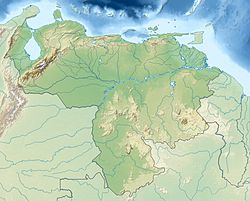Aprada-tepui
| Aprada-tepui | |
|---|---|
 | |
| Highest point | |
| Elevation | 2,500 m (8,200 ft)[1] |
| Coordinates | 05°24′38″N 62°26′54″W / 5.41056°N 62.44833°W |
| Geography | |
| Location | Bolívar, Venezuela |
Aprada-tepui is a tepui in Bolívar state, Venezuela. It has an elevation of around 2,500 metres (8,200 ft) above sea level. It gives its name to the Aprada Massif, which also includes the smaller Araopán-tepui to the east. A steep, semi-circular ridge connects these two summits. Aprada-tepui lies 22 kilometres (14 mi) northwest of the much larger Chimantá Massif and around 25 km (16 mi) east of the Pemón village of Urimán.[1]
Aprada-tepui has a summit area of 4.37 km2 (1.69 sq mi) and, together with Araopán-tepui, an estimated slope area of 210 km2 (81 sq mi).[1] Both peaks are situated entirely within the bounds of Canaima National Park.[2]
Flora and fauna
[edit]Frogs Pristimantis jamescameroni[3] and Anomaloglossus breweri are endemic to Aprada-tepui—they are found nowhere else.[4]
See also
[edit]References
[edit]- ^ a b c Huber, O. (1995). Geographical and physical features. In: P.E. Berry, B.K. Holst & K. Yatskievych (eds.) Flora of the Venezuelan Guayana. Volume 1. Introduction. Missouri Botanical Garden Press, St. Louis. pp. 1–61.
- ^ (in Spanish) Torres, I.N. & D.D. Martín (November 2007). "Informe Final de la Evaluación del Parque Nacional Canaima, Venezuela, como Sitio de Patrimonio Natural de la Humanidad" (PDF). Mejorando Nuestra Herencia.
- ^ Frost, Darrel R. (2020). "Pristimantis jamescameroni Kok, 2013". Amphibian Species of the World: An Online Reference. Version 6.1. American Museum of Natural History. doi:10.5531/db.vz.0001. Retrieved 23 June 2020.
- ^ Frost, Darrel R. (2020). "Anomaloglossus breweri (Barrio-Amorós, 2006)". Amphibian Species of the World: An Online Reference. Version 6.1. American Museum of Natural History. doi:10.5531/db.vz.0001. Retrieved 23 June 2020.
Further reading
[edit]- Barrio-Amorós, C.L. (17 January 2006). A new dendrobatid frog (Anura: Dendrobatidae: Colostethus) from Aprada tepui, southern Venezuela. Zootaxa 1110: 59–68.
- (in Spanish) Brewer-Carías, C. (2010). El origen de los tepuyes: los hijos de las estrellas. Río Verde 3: 54–69.

